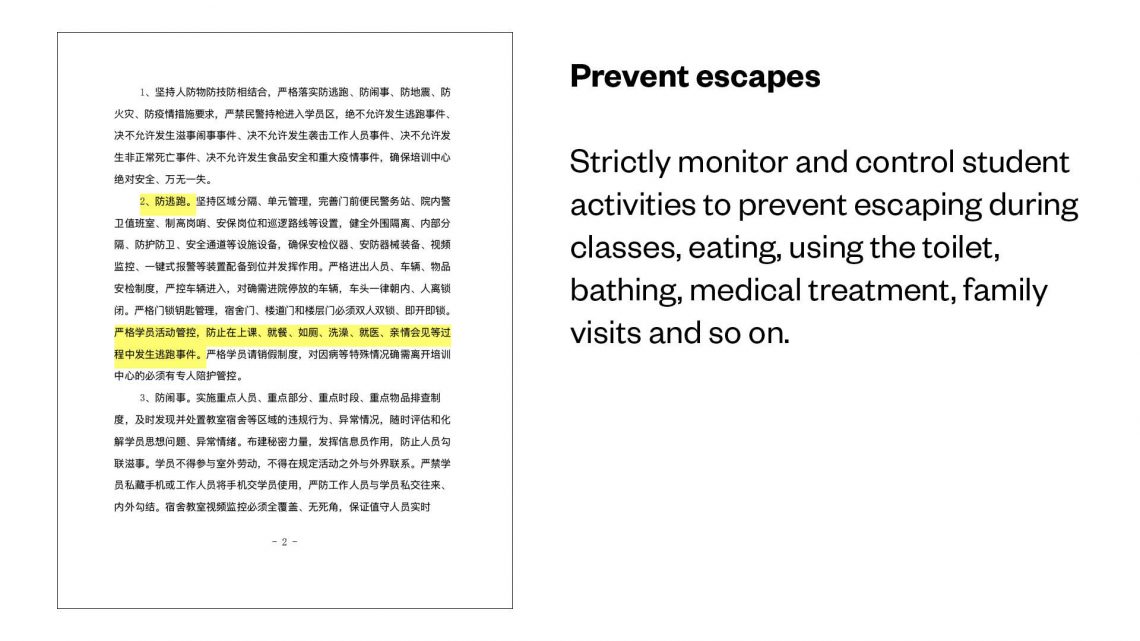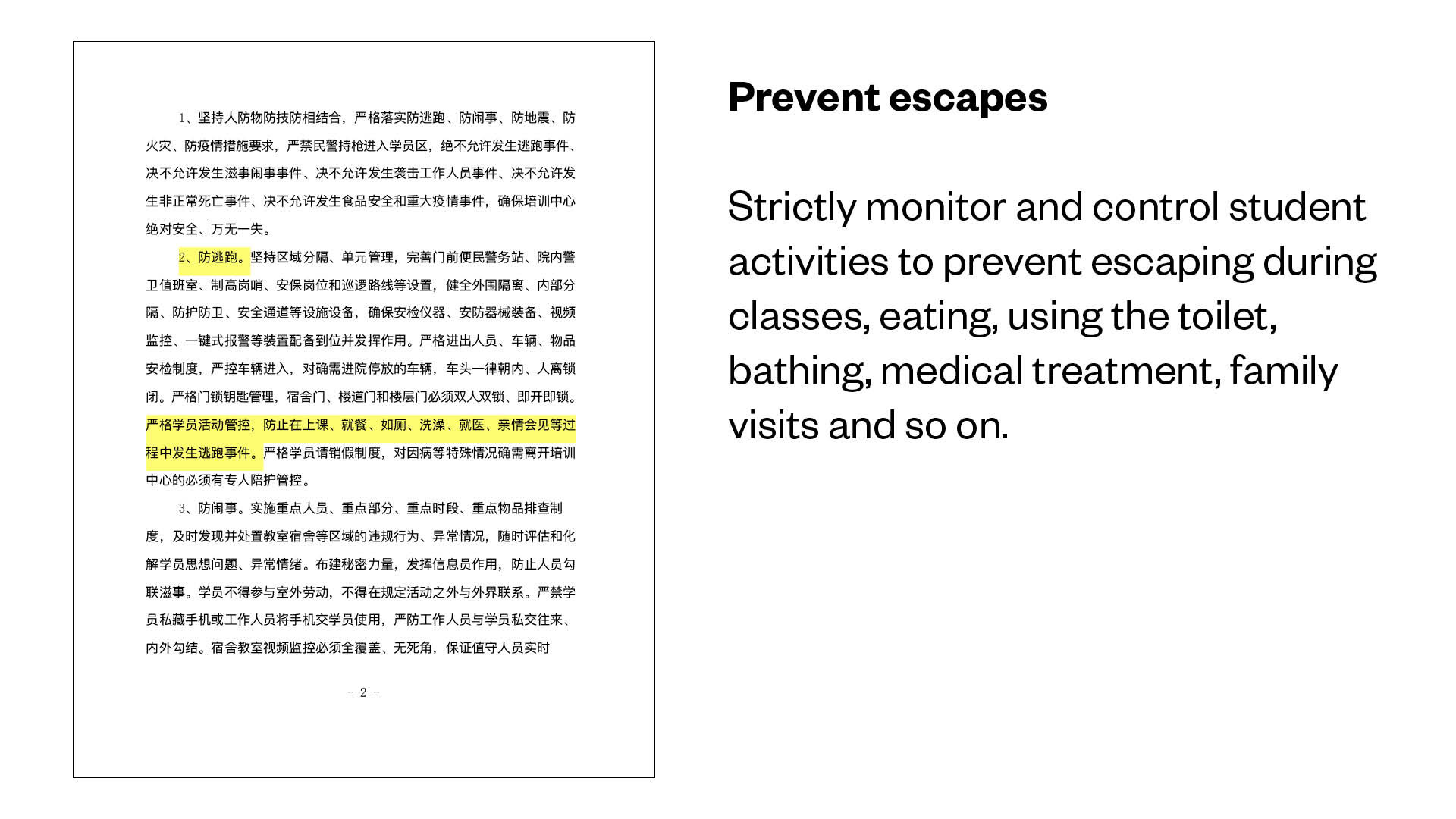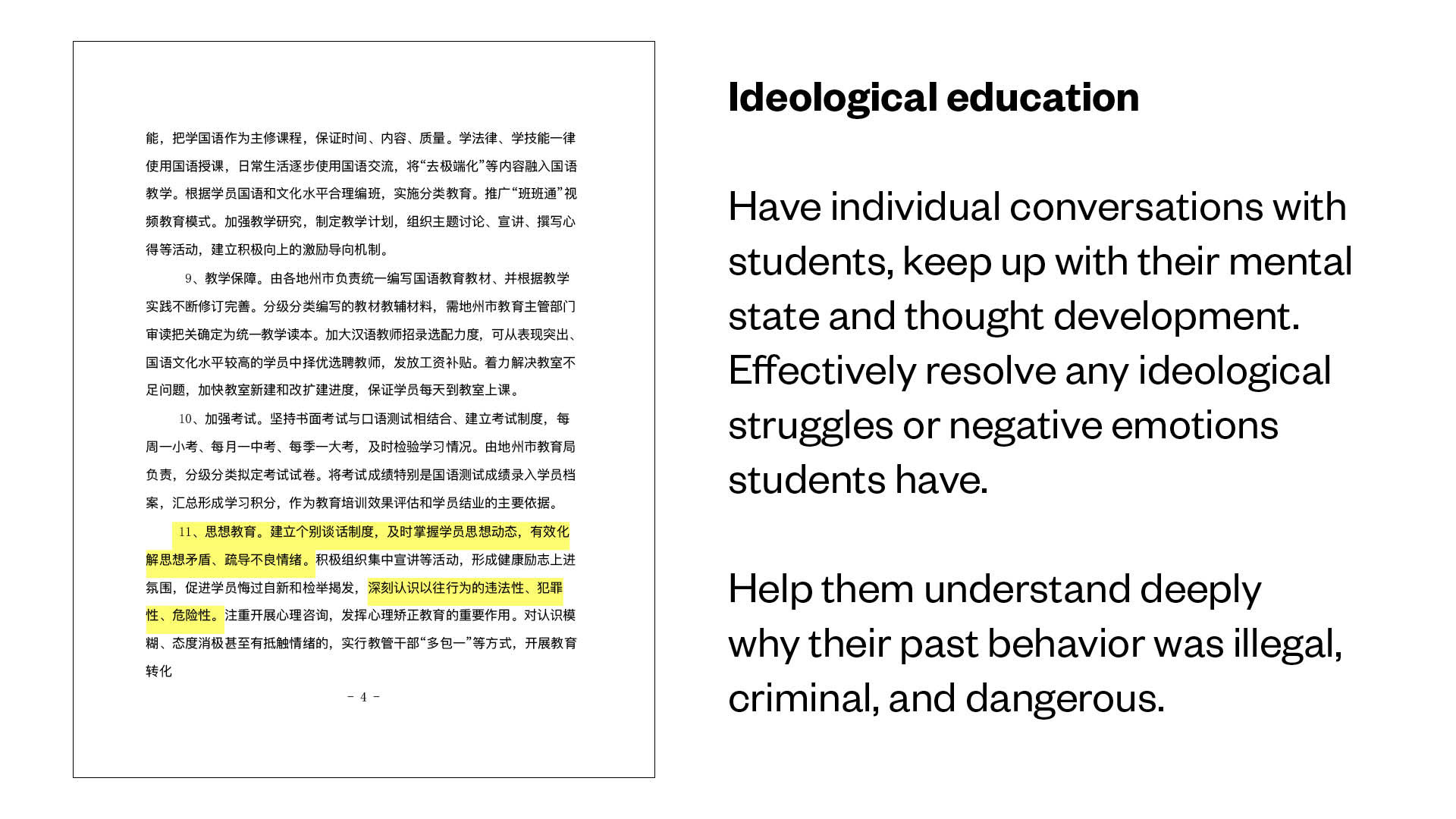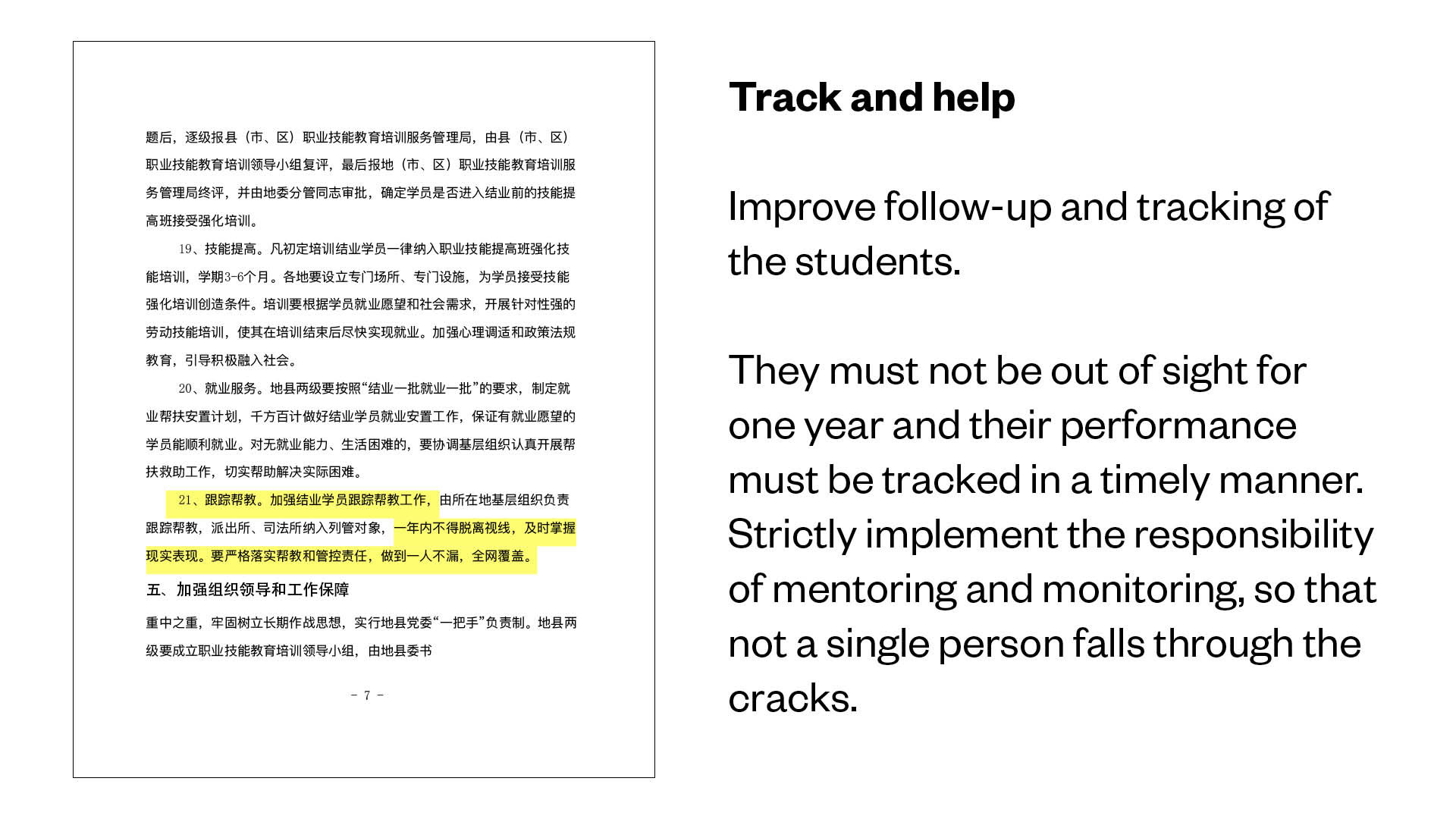
‘Prevent Escapes’: Leaked Documents Detail Brutal Reality of China’s ‘Re-education’ Camps for Muslims
November 24, 2019As many as 1 million Chinese Muslims are believed to have been sent to “re-education” schools in the region of Xinjiang over the past three years. The “students” are interred in highly-secure, prison-like facilities with double-locked doors and surveilled 24 hours a day. They are allowed little or no contact with the outside world. There are informants among them to prevent people from organizing.
Everyone has a score, based on things like how well they’re learning Mandarin and adopting what the state sees as the correct ideology. If they’re good, their score increases, and they have a better chance of getting out. If they’re bad, they’re punished. They must attend classes, where they are told how to be model Chinese citizens — and repent for extremist thoughts the state believes to be rampant among its Muslims.
A leaked manual for the implementation of these re-education camps reviewed by VICE News lays out in specific, brutal detail exactly how the Communist Party of China is instructing local officials to run the re-education camps. The goal is to assimilate long-marginalized religious and ethnic minorities into Han Chinese culture, language, and beliefs — including unquestioning support for The People’s Party.
The classified, eight-page document was apparently written by the internal Party Political and Legal Affairs Commission in a subregion of Xinjiang and dated 2017 — around when China began running the camps. It provides detailed directives on “standardizing the work” of the re-education camps, essentially serving as an operating manual.
“This document is the smoking gun that tells us these vocational training centers are in fact prisons.”
The document is believed to have been leaked by an official working for the Chinese government in Xinjiang. It was sent by this official to a VICE News source on the situation in Xinjiang who lives outside the country. The official said the world needed to see the document, and expressed their desire for an end to the difficult times facing Uighurs, a Muslim ethnic minority being sent to the camps.
“This document is the smoking gun that tells us these vocational training centers are in fact prisons,” said James Millward, a China scholar and historian at Georgetown University.
The camps, which hold ethnic Uighurs and Kazakhs, are shrouded in secrecy. China has framed them as voluntary training centers designed to curb extremism, but survivors, including a number who have spoken to VICE News, have described conditions in line with what these documents mandate. They’ve also recounted physical and psychological torture.
The handbook is the latest leak of internal documents related to the mass incarceration of China’s minorities. Last week, the New York Times published a report on more than 400 pages of internal papers on how the program began and how it continued, despite resistance from within government ranks. Beijing’s foreign ministry condemned the report and accused the authors of misinterpreting the documents, but they did not deny that the papers were real. The Ministry of Foreign Affairs did not reply to a VICE News request for comment by time of publication.
It is incredibly dangerous for Chinese officials to leak documents — if caught, they would likely face imprisonment. The fact that classified documents are getting out suggests that some officials are deeply disturbed by Xinjiang’s camps.
VICE News has since been told by two sources that government officials have been instructed to burn all paper documents linked to Xinjiang, and to restrict access to the remaining digital copies that should now only be held on one computer per locality.
“This is the most comprehensive description I have seen of the prison aspect of the camps, making it clear that these are not schools and not students,” said Darren Byler, an anthropologist and researcher on the Uighur crackdown and dispossession at the University of Colorado. “The level of detail in this writing points to a level of intimate knowledge with the workings of the camp infrastructure.”
Inside China’s re-education camps
The re-education camps were opened about three years ago as Beijing's latest response to discontent over Chinese authority in the region, and now hold as many as 1 million people according to organizations cited by the United Nations. That tension has led to occasional clashes and violent incidents over the last decade, including riots in 2009 that killed nearly 200 people, most of them reportedly Han Chinese, and a 2014 attack on a market that killed 39 people. Beijing blames this unrest on Islamic extremism and ethnic separatism, and has responded with a widespread crackdown on Uighur people.
China has pushed back on the growing international condemnation of its mass detention program of Muslims, most of whom are Uighur. They say their “vocational training centers” prevent terrorist attacks and have expanded development and prosperity across the region. But the handbook essentially outlines high-security prisons where inmates are incentivized to toe the line through the promise of eventually getting out on good behavior.
The document was written in a large subregion of Xinjiang. It’s unclear how widely it was disseminated, but certain instructions say they should be followed by “all localities.” And the guidance is in line with what survivors have told VICE News about life in these internment camps.

Uighurs and Kazakhs in Xinjiang, as well as those who are now based in Europe and America, have described the camps as prisons rife with psychological abuse. The document notes that punishment of detainees is permitted, but it does not go into detail. Former detainees have told us that physical, verbal, and sexual abuse are also common.
The documents describe the need for tight security repeatedly and in great detail. One directive reads, “Strict door lock key management, dormitory doors, corridor doors and floor doors must be double locked,” and another advises, “Strictly implement 24 hour shift duty.”
The document instructs officials to have “strict management” over every detail of inmates’ lives, “to prevent escapes during class, eating, using the toilet, bathing, medical treatment, family visits and so on.”
The handbook says this staffing security should be combined with extensive surveillance technology designed to capture every movement of those inside. “The video surveillance of the dormitories and classrooms must be fully covered without any blind spots, ensuring that the duty guards can monitor in real time, keep a detailed account and report suspicious activities immediately,” it says.
It also instructs camp staff to recruit informants among the inmates. “Build secret forces, use informants to prevent people from colluding to create troubles,” the document reads.
“What they’re outlining here requires tremendous expenditure and time, as well as the complete reorganization of different local government departments, including public security, judicial, education, and hygiene,” said Millward, the expert from Georgetown University.
The documents say “student” life should have a highly disciplined, military-style routine. “The student is required to have a designated bed, line up in the same order, sit in an assigned seat in the classroom, have a consistent position during skills training, and it is strictly forbidden to exchange these without authorization.” Every day, students are expected to attend classes to learn Mandarin — stated in the document as “the national language,” although hundreds of languages, including Uighur and Kazakh, are spoken in the country — along with Chinese law and vocational skills.
“People get tortured until they are almost dead or useless.”
Such details reflect what VICE News has learned about life inside the camps from those who’ve lived it. Many described a precise daily routine: rising early; making their beds; sitting crossed-legged for hours as they listened to lectures.
The document, however, emphasizes “ideological education” as one of the most important goals. Government employees are instructed to “use psychological counseling” in order to “promote students' repentance” and “help them understand deeply why their past behavior was illegal, criminal and dangerous.”

This means detainees are encouraged to publicly denounce any thoughts or behaviors that could be deemed to upset the state. Several survivors have reported this. “Once a week, we had to write about our regrets,” Gulbahar Jelilova, who said she was held in a camp for over a year between 2017 and 2018, told VICE News.
The document also contains a number of directives to punish anyone caught violating the rules. The methods of punishment are not specified, but several survivors have relayed their experiences.
Kazakh national Omir Bekali was among the first to speak out about his ordeal in a Chinese internment camp. He says that camp staff forced detainees to eat pork and drink alcohol in a bid to strip them of their piousness.
“If we refuse it, there are five punishments waiting for us,” said Bekali, who was a businessman in Xinjiang before he was incarcerated. He said he was beaten multiple times and held in a “tiger chair” — a metal chair he was strapped into — and sent to solitary confinement for long periods of time.
Bekali said prison officials also used extreme temperature to torture prisoners. “If it's summer, we have to stand naked until you pass out. If it's winter, stand on ice naked and they will spray water on you.”
“People get tortured until they are almost dead or useless.”
Life after release
The document also lays out “graduation” requirements for detainees. They must have spent one year in the facility. They must be staying in the lowest-security section of the camps, referred to as “general” — the two others are “strictly regulated” and “heavily regulated.” Their total points, accrued through education, training, “ideological transformation,” and compliance, must meet the prescribed standard.
And there can be no other mitigating factors that would suggest they shouldn’t be released.
But even “graduation” doesn’t mean freedom. The re-education camps are followed by vocational training. The manual states that all “students” who have completed their re-education, which for model students will take a mandatory minimum of one year, will then be “included” in a vocational skills improvement training for 3-6 months.

It says the type of training should be based on the “student's” employment goals, but also on society’s needs. The Times reported last year that inmates have been forced to work in a sewing factory connected to the camps.
The released detainees should also be monitored, even after they re-enter society. The document states, “They must not be out of sight for a year,” and calls for officials to keep up their “latest performance.”
“It is necessary to strictly implement the responsibility of mentoring and monitoring, so that not a single person falls through the cracks.”
Additional reporting by Titi Yu.
The documents in this article are not the originals and have been retyped.
Cover: This photo taken on June 4, 2019 shows a facility believed to be a re-education camp where mostly Muslim ethnic minorities are detained, north of Akto in China's northwestern Xinjiang region. (Photo credit should read GREG BAKER/AFP via Getty Images).

